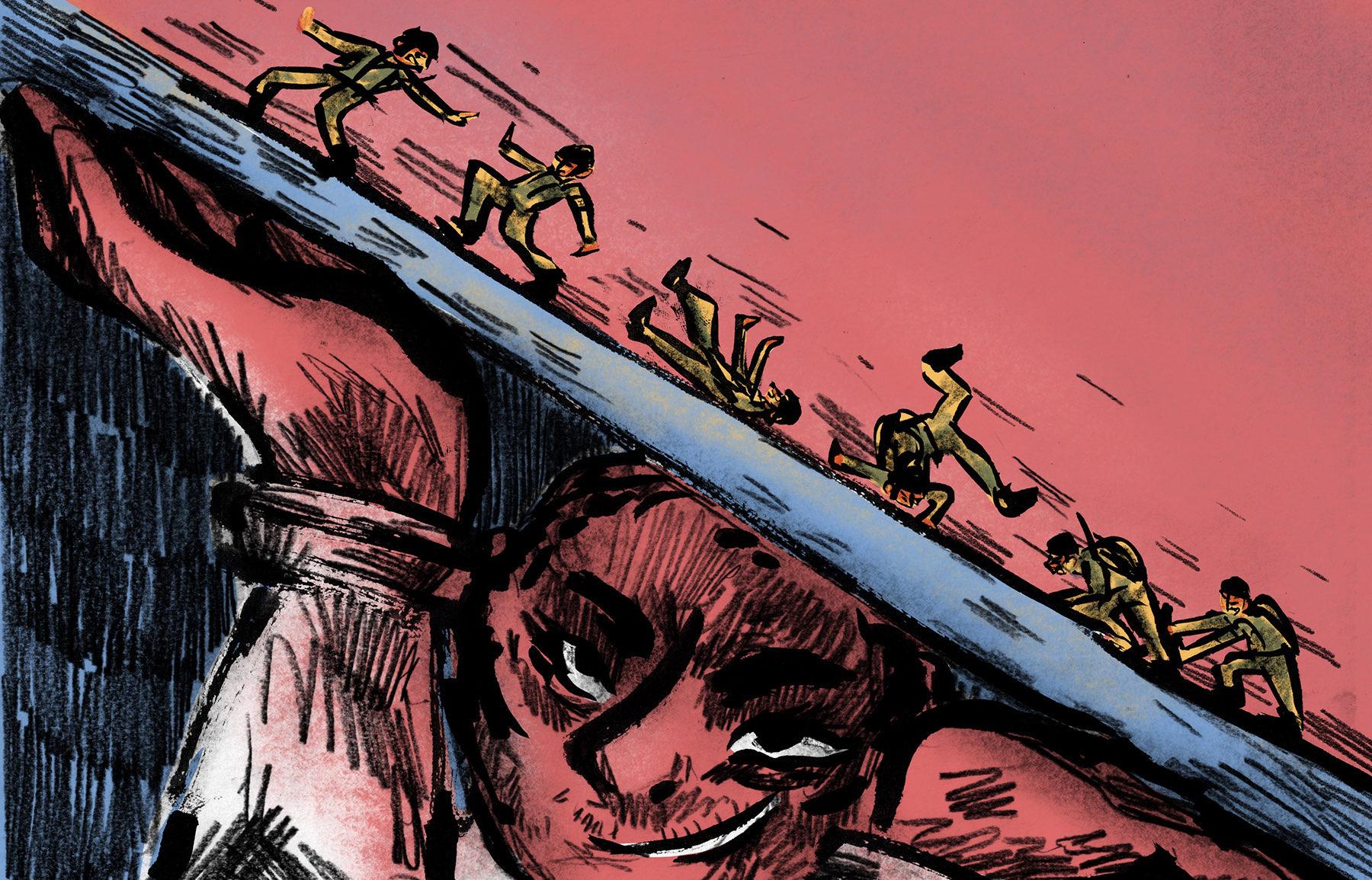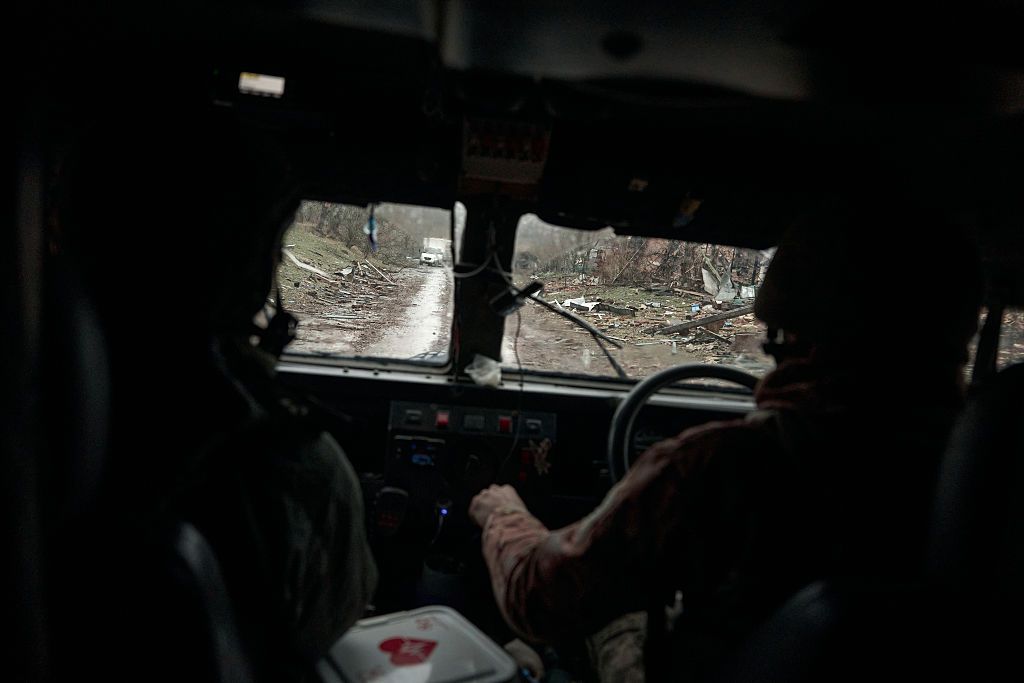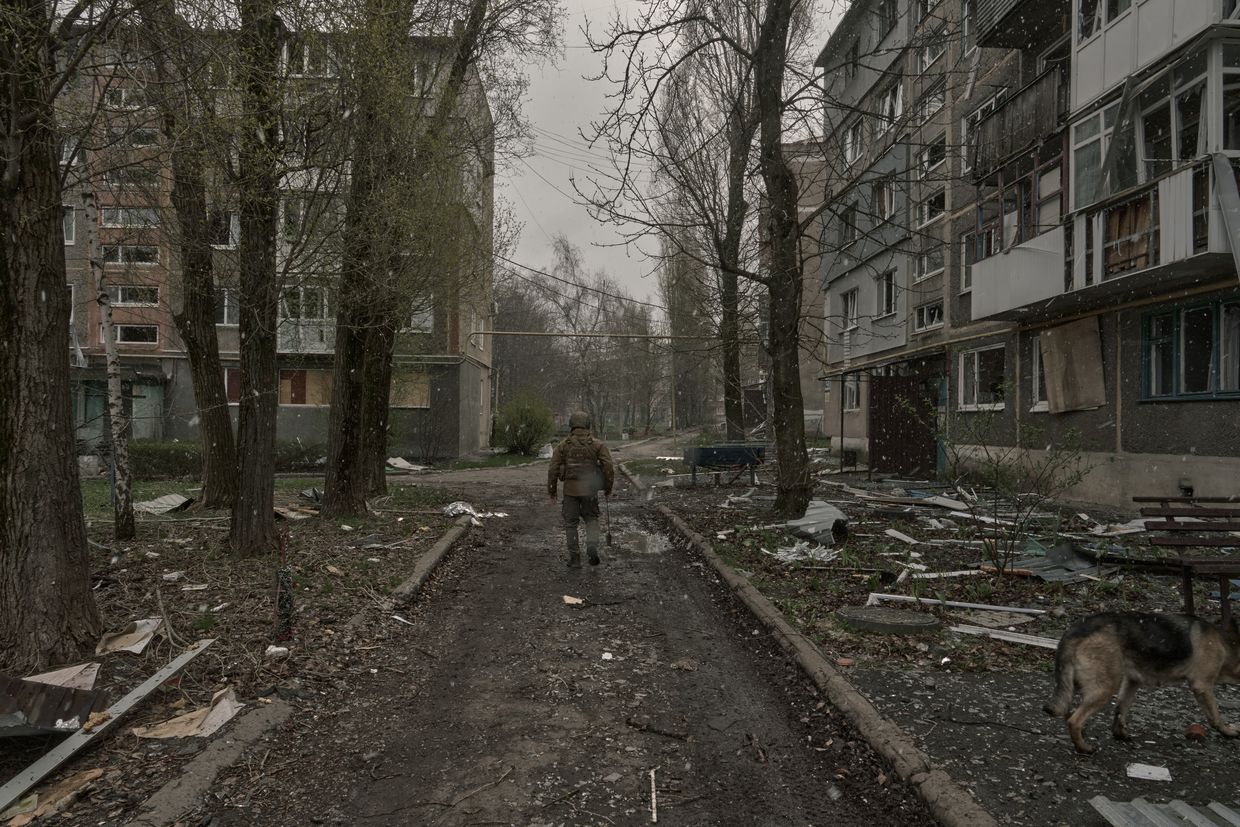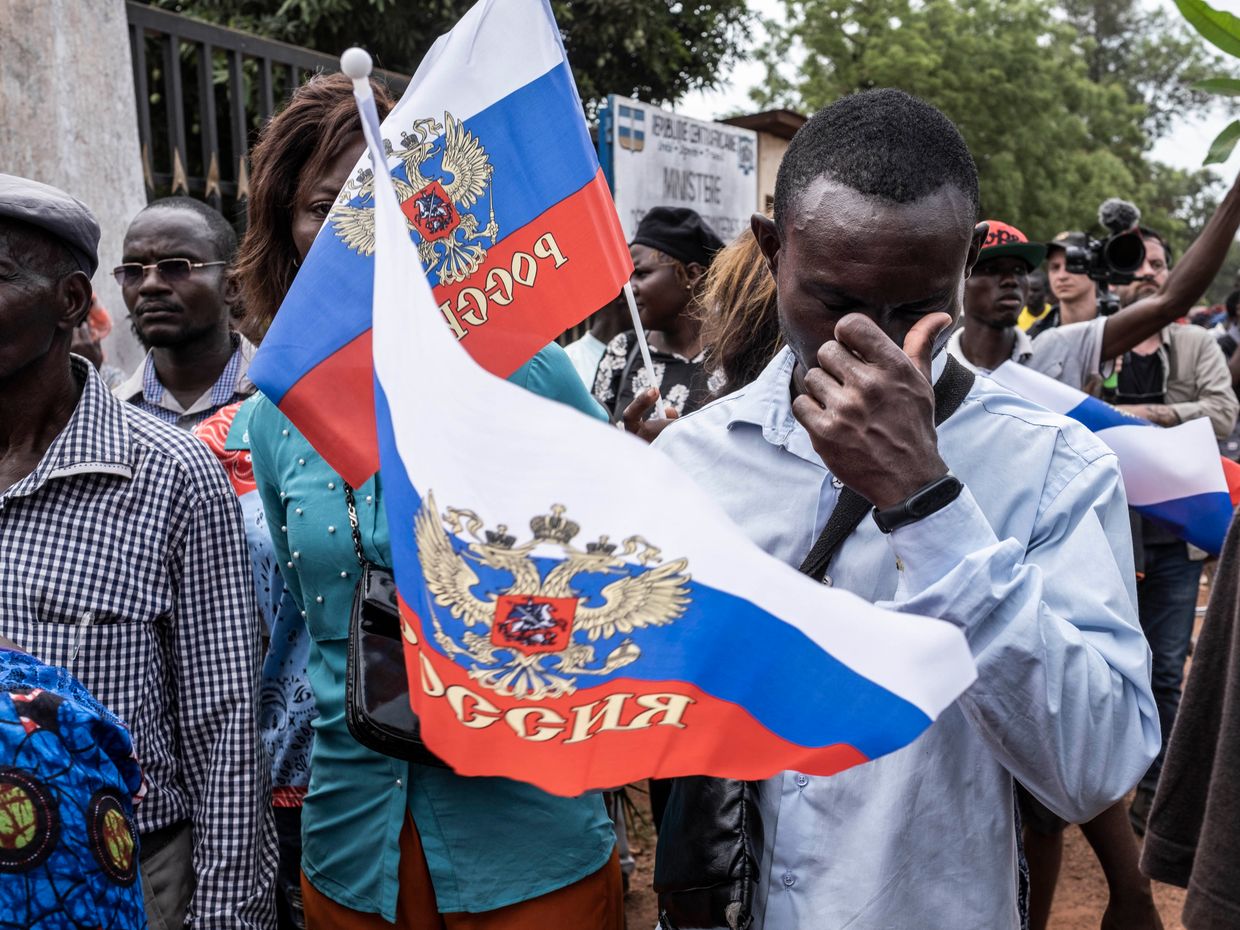Editor’s Note: This is the second part of the Kyiv Independent’s investigation into the International Legion – a military formation created for foreign fighters dedicated to defending Ukraine. Published in August, the first part of this story unmasked alleged endemic abuse of power in the leadership of the military intelligence-run wing of the Legion.
This follow-up article, partly produced in collaboration with the Superwizjer program airing on the Polish TVN channel, sheds light on previously unknown alleged misconduct by the Legion’s leadership, reveals that it’s of a far-reaching scale and involves both wings of the Legion, subordinated to different agencies. Soldiers who sounded the alarm about problems within the Legion claim to have received threats, gotten denounced, or been kicked out. For their safety, we are protecting their identities. Upon soldiers’ request and considering security risks, we no longer identify them by country, as we did in the first story.
To avoid putting them in additional danger, the commanders in the story are identified by their full name only if they have public profiles or their affiliation with the International Legion has been publicly revealed before.
Top findings:
- Multiple legionnaires allege light weapons, including Western-provided arms, go missing. Legionnaires suspect specific commanders of misappropriation.
- Soldiers claim certain commanders threaten them with guns, bully them, and harass them, including sexually.
- Soldiers accuse particular commanders of stealing their personal equipment.
- For flagging the leadership’s wrongdoings as well as for being sick, soldiers allegedly get kicked out of the Legion under made-up pretexts like being spies or deserters.
In late spring, a soldier who had traveled across the ocean to join the International Legion following President Volodymyr Zelensky’s call to foreign soldiers to join Ukraine’s fight against Russia was preparing for deployment to a southern city, then close to the front line, when he heard worrying news coming from the front line.
A fellow fighter told him that his team had suffered casualties in the same area because they lacked a vital weapon component, a Command Launch Unit, or CLU, for an American-made portable Javelin anti-tank missile system.
They had to borrow one from another unit. When they tried to set it in motion, it failed to work.
“They couldn't blow the (Russian) tank off and the tank found them and started shooting at them. It's f*cking frightening,” the now-former legionnaire told the Kyiv Independent.
As he was getting ready to head to the same southern city himself, his comrade’s experience made him anxious. This story especially worried him since he had just seen a bunch of fully operational computer parts for Javelins at the Legion’s base in Kyiv.
Later he realized that it wasn't a one-time incident but a systemic problem where weapons would be missing from where the International Legion's soldiers expected to find them.
Over a dozen other foreign fighters in conversation with the Kyiv Independent accused their commanders of stealing small arms and light weapons that they said went missing from the Legion’s armory rooms. Some soldiers witnessed arms being loaded into what they described as civilian SUVs to then vanish. It raised suspicions as the drivers often kept the lights off and weren’t wearing military clothes, legionnaires said.
This was one of the reasons that led many legionnaires to believe that light weapons were being misappropriated.
“I couldn't help but think that maybe if these weapons were in better hands that would have helped…or be used to win this war,” one soldier said.
The Kyiv Independent spoke to over 30 sources, including former and current legionnaires, volunteers helping the Legion, and officials. The allegations in this story are based on interviews, written testimonies, official reports, medical records, photos, videos, and audio files.
Pieced together, this evidence alleges that the leadership of both wings of the International Legion, military intelligence-run and army-run, could be implicated in various sorts of misconduct, including harassment and physical threats, illegal expulsion of nonconformists, as well as theft of soldiers’ personal equipment and the misappropriation of light weapons.
‘The word is out’
Allegations of arms misappropriation are a contentious issue in Ukraine, which depends on Western military aid to successfully fight back Russia’s brutal invasion. The issue has appeared in statements opposing weapons supplies to Ukraine, including in the West, likely in an attempt to tarnish Ukraine’s image and undermine arms supplies.
Russian propaganda media outlets spread stories about the alleged theft and trafficking of all sorts of Western arms en masse in Ukraine to discredit both the Ukrainian government and the country’s Western allies.
The Kyiv Independent found no evidence backing such claims. The publication, however, collected a body of testimonies showing that specific instances of light weapons and small arms disappearance are linked to the alleged mismanagement by specific commanders in the International Legion.
Investigators who claimed to be affiliated with the U.K. government are looking into the Western-provided arms allegedly going missing in the Legion, according to the Kyiv Independent’s sources.
“The word is out,” said a legionnaire who claims he was helping an unofficial British inquiry into arms going missing in the Legion.
The Embassy neither confirmed nor denied looking into arms disappearance in the Legion, but told the Kyiv Independent they “are conducting a rigorous assessment of the risks associated with providing weapons for the defense of Ukraine.”
The legionnaires who spoke to the Kyiv Independent don’t know where the light weapons they suggest were stolen might have ended up. They have no evidence they were smuggled out of the country.
Reports on weapons going missing, however, shouldn't be the reason for Western countries to halt military aid to Ukraine, believes Ian Bond, retired British diplomat and the director of foreign policy at the Centre for European Reform.
“All the evidence is that major donated weapons systems are being well looked after and used to good effect against Russian aggression, so there is no reason for the West to suspend deliveries,” Bond told the Kyiv Independent.
“Almost every army suffers some level of theft of weapons and ammunition (...) Given the fact that Ukraine is fighting a war for national survival, in which Western weapons are playing a vital role, I would be very surprised if many people in the Ukrainian Armed Forces were stealing or illicitly selling the weapons on which their lives depend,” he went on.
The Ukrainian government has shown signs of taking the reports about missing weapons seriously. In July, lawmakers voted to create a committee to oversee Western-donated weapons distribution. The initiative came from Zelensky's right-hand man and head of administration Andriy Yermak.
Lawmaker Oleksandra Ustinova, the head of the committee, told the Kyiv Independent that Ukraine’s allies are satisfied with how Ukraine is using Western-donated weapons.
“No one suspects us (Ukraine) of stealing and selling weapons,” she said. “The only questions that are raised are: ‘Why do you give to Ukraine’s Armed Forces more than to the National Guard?’ Technical questions.”
The U.S. Embassy said that they “have been given considerable access and have seen firsthand” how Ukraine secures Western-provided weapons. However, their “ability to execute normal enhanced end-use monitoring procedures remains impacted by security conditions.”
Ustinova, however, admitted that tracking small arms like rifles is “almost impossible.”
A top-ranking official at Ukraine’s State Security Service (SBU) agrees. He is now investigating the disappearance of light weapons inside the International Legion, he told the Kyiv Independent’s partner in this investigation, Poland's TVN.
“I was approached by the guys who serve in the International Legion. They shared with me the facts about weapons going missing,” said the SBU official in charge of the case. He spoke on condition of anonymity as he is not authorized to comment on the matter.
“From that point on, the subject has caught the attention of our department and we requested information about this subject,” he said of Piotr Kapuscinski, one of the Legion’s leaders, who also goes by the name Sasha Kuchynsky.
In an earlier investigation, the Kyiv Independent exposed Kapuscinski to be a former Polish gangster who is allegedly involved in theft, looting, and the harassment of soldiers. Kapuscinski refused to speak to the Kyiv Independent about the allegations and asked not to call him again.
As the SBU officer learned, his colleagues from another department had already been looking into Kapuscinski before he joined the Legion in around March. The SBU’s new investigation into him, launched in August concerns his alleged involvement in arms and humanitarian aid theft.
“It is unclear yet what he does with it, but certain facts indicate that he might be selling it,” the intelligence officer said.
Yet regular legionnaires do not feel like the authorities are taking seriously the Legion’s leadership misconduct, including light weapons misappropriation.
No reaction by the Defense Ministry’s Directorate for Intelligence, also known under its Ukrainian acronym GUR, and the President's Office followed the August investigation by the Kyiv Independent that focused on the military intelligence-run part of the Legion and exposed its commanders, including Kapuscinski’s misconduct in various cases.
This time, however, military intelligence seems to be paying attention to the allegations.
“An official internal investigation is ongoing regarding some of the issues raised in your request,” Mykola Krasniy, press secretary of the military intelligence, told the Kyiv Independent on Nov. 18.
According to Krasniy, the investigation was launched on Nov. 14 following the Kyiv Independent’s request for comment for this article. He was unable to explain why there was no reaction to the allegations in the August story.
Arms go missing
In conversations with the Kyiv Independent, 12 legionnaires accused their commanders of light weapons, small arms and military equipment misappropriation. They provided photographs, reports, and screenshots of the messages they claim to prove these items had disappeared. More legionnaires made similar accusations in written testimonies they filed to their commanders, which have been obtained by the Kyiv Independent.
One such episode took place in May. Back then, the leadership of the Legion’s 1st battalion, which is under the Ground Forces, changed. Bohdan (Editor’s Note: Bohdan is a military commander who doesn’t maintain a public profile. He’s not identified by his full name to avoid putting him in additional danger.), then-commander of the battalion, was out. His successors decided to do an inventory of the battalion’s armory room in a heavily attacked northeastern city. It found serious inconsistencies, according to the legionnaires.
“We were told to do it secretly, without anybody noticing because they didn’t know who was involved in moving the weapons. So me and a team of guys went down into the bunker…Did it quickly, got out there, and then passed it to command,” a soldier who was among those conducting the inventory told the Kyiv Independent.
The new leadership, he said, “started panicking” as there were massive discrepancies between what they should have had and what they in fact had.
Citing his commanders, the soldier participating in the inventory said that among the weapons that allegedly went missing were 54 U.S.-made M4 carbines, several anti-tank weapons like RPGs and NLAWs, grenades, a couple of pistols, and a few thousand rounds of ammunition.
“I was not informed about it. I cannot tell anything to you about it as it is an internal matter of Ukraine’s Armed Forces,” Chief of Staff of the 1st Battalion, Anatoliy, told the Kyiv Independent, redirecting our journalists to the army press center. He hung up and stopped replying before the journalists had a chance to ask for his last name.
The Kyiv Independent asked the Ground Forces of Ukraine’s military to comment on the allegations of missing weapons and misconduct of the Legion’s commanders. The Ground Forces’ press service refused to comment, saying that “the requested information falls within the scope of what can contribute to the enemy’s awareness of the actions of Ukraine’s Armed Forces.”
In a comment to the Kyiv Independent, Bohdan denied any wrongdoing and offered his explanation of what happened to the weapons.
“The approximate number of M4s you ask about was moved elsewhere and not all legionnaires know this,” Bohdan said, adding that his transfer of power upon resignation was conducted in accordance with normal procedures and no concerns were raised. “Weapons were transported to one of the training grounds for the formation of a new unit of legionnaires with the permission of the leadership.”
The Kyiv Independent was unable to verify Bohdan’s account.
“When I was commander, a small number of weapons were lost or destroyed during hostilities. An official investigation was immediately ordered, in accordance with the current legislation,” he added.
Another legionnaire responsible for administrative work said that a then-deputy commander of the 1st battalion under the Ground Forces had told him about nearly 50 M4 carbines disappearing. The legionnaire believes it was the same batch that went missing in the northeastern city in question.
“He told me that rifles have a habit of going missing in (names the city),” the legionnaire recalled the commander saying in late June.
He believes the weapons going missing were U.S.-donated. According to the soldier, in April the 1st battalion of the Legion received a batch of “brand spanking new” M4 carbines that had stamps on them saying “property of the U.S. government.” The price of M4 carbines in the U.S. can start at $600 and go into thousands, depending on the variant.
Several soldiers link the 54 M4 carbines' alleged disappearance in the northeastern city to Chief Sergeant Nikolay (Mykola) Bakaliuk, who was de facto in charge of the armory room at the time, according to the legionnaires.
“Not even that I am not involved, but there was no sale, theft, or anything else,” Bakaliuk told the Kyiv Independent.
“None of the legionnaires is a prosecutor. Only the prosecutor's office can bring charges, and only a court can either confirm or reject them. I will consider everything else as slander,” he said.
“As far as I know, the relevant authorities are already looking into Bakaliuk,” Bohdan said of his former subordinate. “This does not concern me. Time will tell who stole, and who fought the war.”
Allegations against Bakaliuk
Between September and October, over a dozen soldiers filed formal complaints against Bakaliuk to their leadership, calling for his removal. In these reports, they accuse him of corruption, theft of equipment, and bullying.
“He would repeatedly yell and degrade fellow legionnaires and other Ukrainian service members for what appeared as little or no reason,” one testimony reads.
Another soldier accuses Bakaliuk of restricting him from rejoining the Legion one month after he left due to family issues. His mother was dying of cancer and he went home to say goodbye, for which he claims to have received permission from his commander. Bakaliuk, however, did not want him to leave and showed no empathy for his situation.
“He was telling me I am not disciplined and behaving in a feminine way,” the soldier testified.
“I am a fighter with very rich combat experience and a professional soldier with rewards from the U.S. I came all the way to support Ukraine but during my interaction with him, he was insulting me,” his report goes on.
“I know about such complaints about bullying and abuse,” Bakaliuk told the Kyiv Independent.
He then proceeded to accuse his subordinates of a smear campaign. “I know this group of people behind it, who want it all, who are doing it.”
Other soldiers believe Bakaliuk was misappropriating gear and weapons.
“He asked me one day to do a report to record a missing weapon. I was in Kyiv after surgery. I laughed and said: ‘You want me to do a report on a missing rifle when I wasn’t there?’” the report goes on, accusing Bakaliuk of an attempt to forge a document. The Kyiv Independent saw the message exchange between the two that confirmed this account.
Another legionnaire wrote: “We started getting some very expensive things delivered, then Mykola decided he wanted to be in charge of these (things), which from reports of my men never made it to them.”
Broader theft allegations
In April, the soldiers of the intelligence-run wing of the Legion were deployed to a southern city then close to the front line. A big assault operation was coming and they were tasked to assist Ukrainian forces.
They went to the armory room to grab the weapons and ammunition they brought from Kyiv only to discover that the armory was almost empty.
“I saw nothing so I walked out. I was a little in shock,” one soldier said.
According to him, there were eight military sub-units of the Legion at the time in the southern city in question. Every sub-unit brought multiple weapons and placed them in the armory. But in the armory that day, the soldier only saw a handful of small arms left.
The soldiers remembered that, upon arrival in that city, they were ordered to stay in the barracks for about five days before being allowed to go out.
“That's when we assume that the ammunition started to go missing,” he said. He added that his commander told him that Kapuscinski, one of the leaders of the military intelligence-subordinated wing of the Legion, was in charge of the armory room there.
He decided to quit, along with several other soldiers.
“After all the lies and the supplies going missing when we needed them, I had had enough,” he said. “My spirit was broken. I felt we were just being sent to die with little to no supplies, food, ammunition, you name it, we didn't have it.”
Weapons disappearing in the southern city allegedly raised some concerns outside of the Legion.
One soldier claims that around June or July, a person affiliated with the U.K. government in Ukraine contacted him asking to check whether the latest shipment of NATO small arms reached the southern city. He claimed to be conducting an unofficial investigation. The investigator specifically mentioned that Piotr (Sasha) Kapuscinski was in charge of the distribution of the supplies from this shipment.
“Kapuscinski was supposedly the one responsible for the warehouses and disseminating the NATO weapons throughout the units in the area. Somehow, some warehouses became emptied,” one soldier said.
Allegations against Kapuscinski’s supposed misappropriation of weapons fall under two categories: weapons allegedly going missing from armoires, and weapons taken away directly from the legionnaires without explanation.
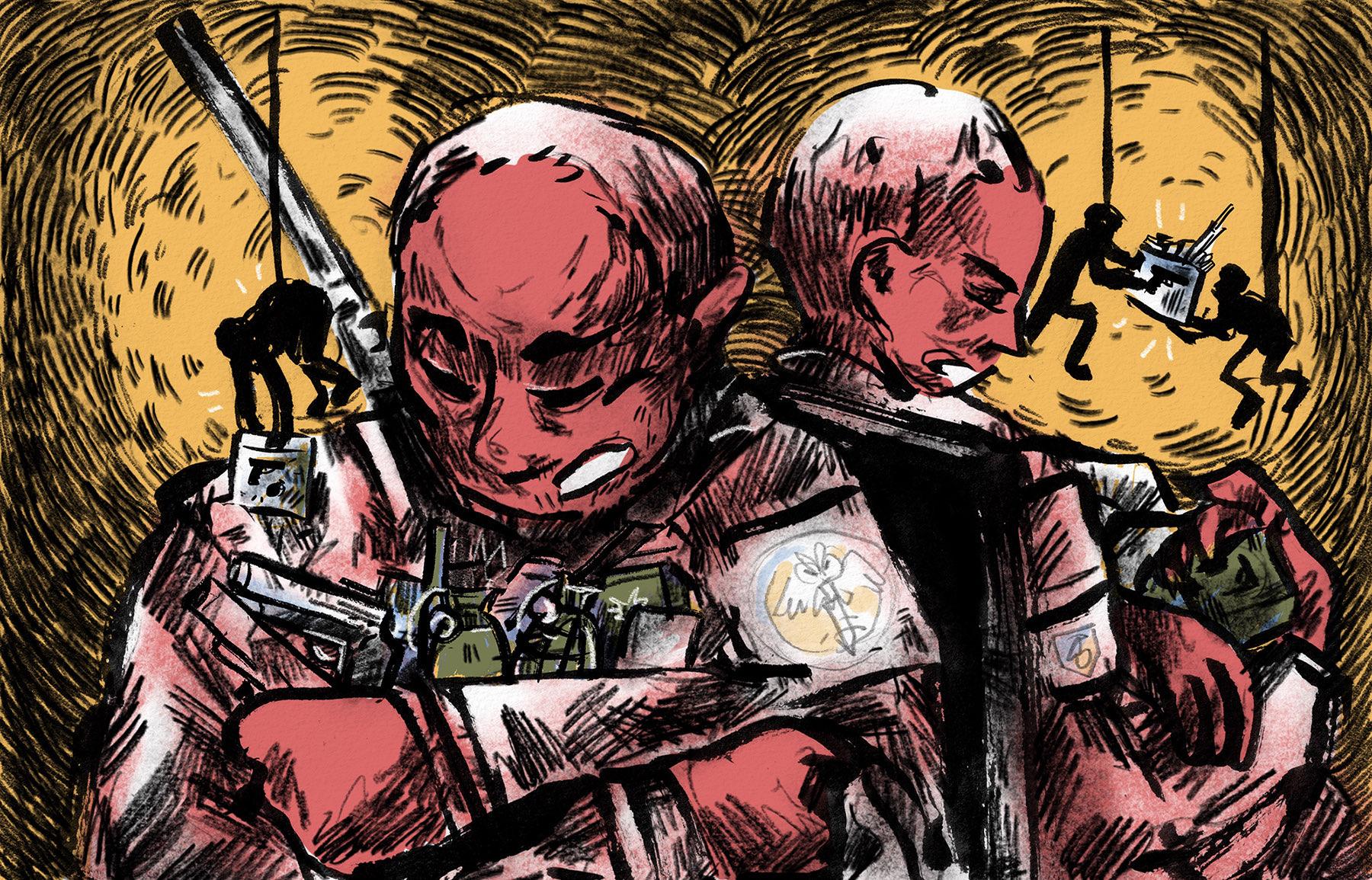
When in Kyiv, Kapuscinski was in charge of the dorms and oversaw the armory room, from where the weapons would go missing, too, multiple soldiers said.
“There were two times when NLAWs would come in at night and get unloaded, and they wouldn't be there in the armory the next morning, which is the only place they would be. That was very suspicious,” said a former legionnaire who while giving an interview to the Kyiv Independent was participating in Ukraine’s counteroffensive in Kharkiv Oblast in September. He got in touch via Starlink. Shelling was heard in the background as he spoke.
There is no chance, he believes, that these weapons were given to some other unit. He believes that they were the only unit in the area at the time and therefore, the only ones who could have used the NLAWs. He said he did not report missing NLAWs to the commanders because he was afraid of Kapuscinski.
Two fighters independently said bayonets or knives for CZ and SCAR-L rifles disappeared from the armory room in Kyiv under Kapuscinski around April.
“I was thinking that a couple of days ago I saw with my own eyes hundreds of bayonets and now there is none of them in the armory room,” one soldier said of 200-300 bayonets for CZ rifles going missing. He said that it was a popular belief in the Legion that Kapuscinski was taking and selling the weapons.
According to multiple legionnaires, Kapuscinski often ordered them to suddenly hand him their weapons and ammunition and would take them away for good. They obeyed out of fear.
One of the soldiers complained that Kapuscinski had ordered his team of 20-30 people to put all their weapons and equipment in "garbage piles." Kapuscinski and his people then allegedly went through the soldiers' stuff, cherry-picked the best, including Legion-issued Glock pistols, and took it away.
In early June, at least a couple of hundred Glock pistols would also vanish from the armory room, said two other legionnaires.
In conversations with the Kyiv Independent, seven legionnaires accused Kapuscinski of taking away their personal equipment, including drones, flashlights, and protective gear they bought for themselves.
“He was like a security control that checks your bags and takes stuff,” one legionnaire said of Kapuscinski.
Kapuscinski’s room in the Legion’s headquarters, legionnaires said, gave them ideas about what his actual dealings might be.
“His room was full of alcohol and stolen stuff. People used to see it when he opened the door and I also saw it,” one fighter said.
“This guy was taking ammunition, rifles, sidearms, firearms, helmets, gear whatever he liked, I guess. He took it to his own personal quarters. And I saw this myself from the second-story window,” another soldier said.
This soldier emphasized that there were designated areas where supplies would be kept in storage, and Kapuscinski’s room wasn’t on that list.
Those who were close to Kapuscinski allegedly received gifts from him, like alcohol, cigarettes, and snacks, from him, according to the soldiers. Soldiers also accused him of offering to trade their equipment for something from the armory room.
“He was just, you know, collecting the best of the best and trading the stuff,” said a legionnaire, who refused Kapuscinski's alleged offer to trade his pistol holster for something from the armory.
In its previous story, the Kyiv Independent revealed that Kapuscinski had offered legionnaires to buy equipment from him, such as military thermal imagers, as well as took away half of the equipment they received from volunteers and friends, which they called “Sasha tax.”
Soldiers claim that Kapuscinski used to order them to carry boxed weapons from the armory to what they described as civilian vehicles. It raised suspicions among some legionnaires as the drivers would often keep the lights off and wear civilian clothes. “I never saw any papers being signed,” one soldier said.
One of those who participated in it recalled that he carried boxed U.S.-made CZ rifles under Kapuscinski’s directions. He also saw NLAW containers and Javelin tubes in the back of the van.
Legionnaires say that amid war, it’s easy to move small arms around without anybody noticing. The SBU officer investigating weapons going missing in the military intelligence-run wing of the Legion agrees: “The country is at war. No one will be surprised if you transport protective gear or weapons.”
“When weapons arrive at a unit, it is official. What happens then is very complicated to establish as it is quite easy to write them off (the weapons) as lost, broken, or destroyed during combat,” he went on.
“It only becomes noticeable when stuff is not available and not getting to the people,” one soldier said. That’s also how legionnaires who spoke to the Kyiv Independent started noticing it.
A person who used to be responsible for logistics in the Legion claims that often supplies he had delivered did not reach the soldiers on the battlefield.
“You have the guys on the front line, the foreigners themselves, requesting optics or food or X, Y, and Z, whatever…and then you bring those things to the warehouse,” he said.
A couple of weeks later, the soldiers would request the very same things he had just brought, saying they never received them.
He believes that commanders, who “inspected every piece of equipment you were bringing,” might be behind it.
“When you have some corruption in a unit, making sure that supplies get to the people who need them becomes pretty difficult,” the former logistics officer said.
Untouchables
Since April, the legionnaires had unsuccessfully complained about their leadership misconduct to the parliament and the President’s Office. According to them, the parliament did nothing, but the President’s Office passed their testimonies to the Luhansk Specialized Military and Defense Prosecutor's Office of the Joint Forces.
In late June, its prosecutors opened a case into Kapuscinski’s alleged abuse of power in the Legion. The probe is conducted by the State Bureau of Investigations. It is ongoing and officially has no suspects yet. If found guilty, Kapuscinski faces up to 12 years in prison.
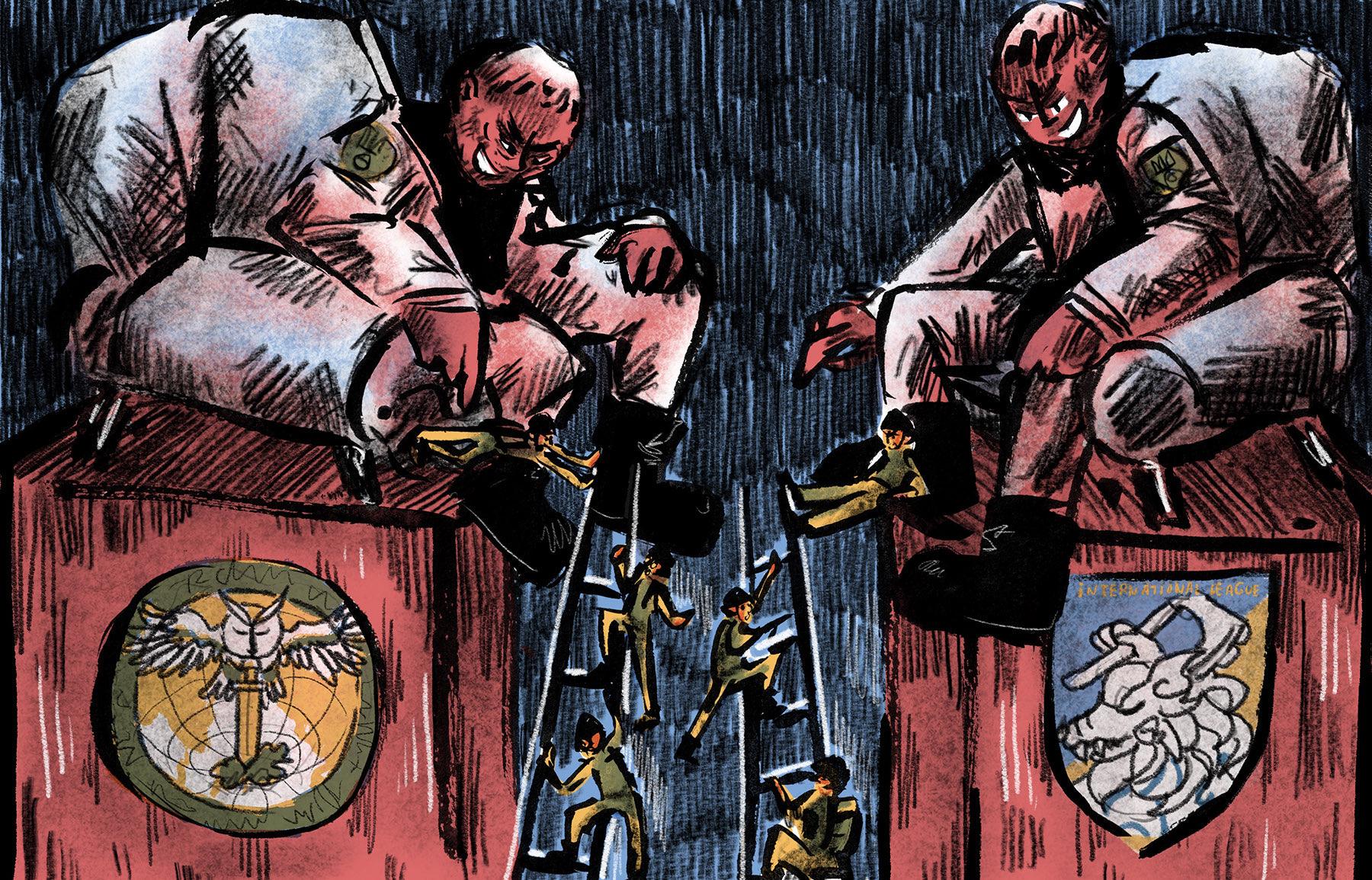
In August, the SBU also opened a probe into Kapuscinski’s alleged involvement in arms and humanitarian aid theft, according to the Kyiv Independent’s partner TVN’s source in the SBU.
Meanwhile, Kapuscinski is wanted in Poland for fraud. Following the Kyiv Independent’s August investigation into him, the Polish prosecutors once again requested from their Ukrainian colleagues help in bringing Kapuscinski to justice.
“(Kapuscinski) is suspected of committing multiple crimes in Poland, for some of which he was convicted, but did not serve his sentence due to fleeing to the territory of Ukraine,” reads a letter provided to the Kyiv Independent by Ukraine's State Bureau of Investigations.
In Ukraine, Kapuscinski was charged with aggravated robbery in 2016 and of illegal arms possession in 2021. After the full-scale Russian war broke out in February, Kapuscinski joined the military, at which point the courts suspended his case.
Despite the accusations and active investigations against him both in Ukraine and Poland, Kapuscinski maintains his high-level position in the Legion, according to the Kyiv Independent’s law enforcement and military sources.
“He was untouchable,” a soldier who was among the first to join the Legion, but is no longer there, said of Kapuscinski. “No matter how many reports I brought (to Kapuscinski’s commandment).”
“He was literally behaving like a mafia boss,” another former soldier said of Kapuscinski.
Legionnaires said that backing of the military intelligence (GUR) Major Taras Vashuk helped Kapuscinski get away with stealing and abusing soldiers. (Editor’s Note: More about it in our first story about the International Legion). Vashuk did not respond to the Kyiv Independent’s request for comment.
For his part, Vashuk has also survived complaints from legionnaires.
Broda’s crimes
Little did his subordinates know that Piotr Kapuschinski indeed had a mafia past.
In the early 2000s, Kapuscinski or Broda (Beard), a then-member of the influential Pruszków gang, served time in a Polish prison for robbery, kidnapping for ransom, drug crimes and stabbing a victim in the chest, among other crimes. His fellow inmate who at the time was part of the Grupa Mutantów (Piastowska) organized crime ring told the Kyiv Independent that prisoners quickly realized that Broda was a police informant.
Cooperating with law enforcement eventually gave Kapuscinski a “crown witness” status, which meant protection in exchange for information.
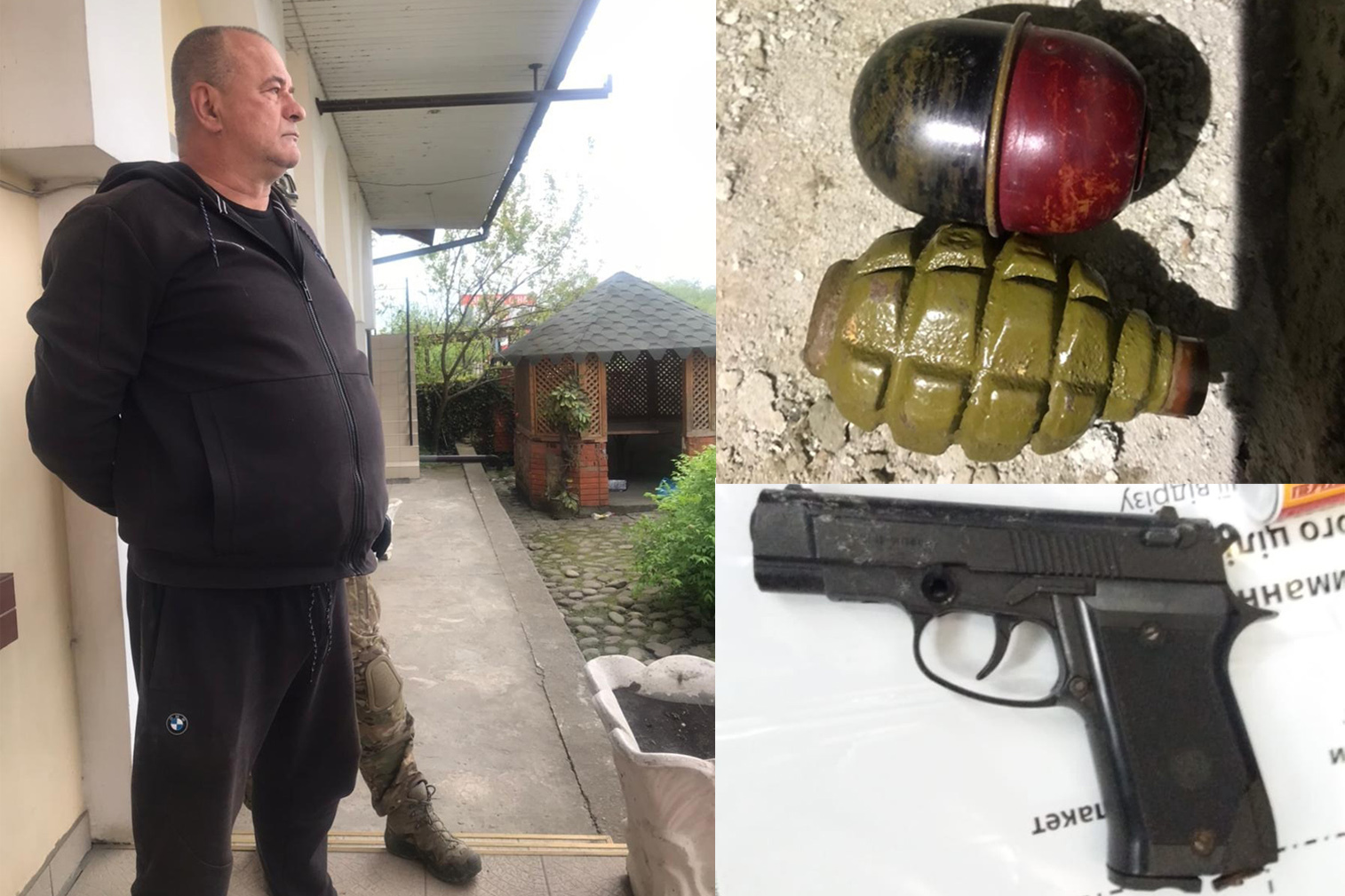
According to the court documents reviewed by Kyiv Independent’s partner in this story, Poland’s TVN, this privilege helped him avoid responsibility for over 70 different charges including illegal firearms possession, bribery, kidnapping, beating, hostage-taking, human trafficking, and financially benefiting from prostitution. In return, he had to extensively testify accusing dozens of people of various crimes. Polish media reported that some of his testimonies proved false.
“He was a witness to any cases they wanted,” said the former fellow inmate of Kapuscinski and a former member of the Polish criminal group.
“They wanted more, and then it turned into (the fabrication of cases),” he went on.
Eventually, Kapuscinski’s relationship with the authorities turned sour and he lost his status. In 2014, he fled Poland, only to resurface in Ukraine two years later.
In October 2016, Ukrainian authorities investigated Broda for sexual assault and aggravated robbery but charged him only with the latter. He was detained and spent over a year behind bars.
In 2017, Warsaw asked Kyiv to extradite Kapuscinski. Ukrainian authorities agreed but said they would first try him themselves.
In May 2021, law enforcement found a semi-automatic pistol, bullets, and explosives in Broda’s possession. He faced up to seven years in prison for having illegal weapons but was almost immediately released on bail of nearly $2,500.
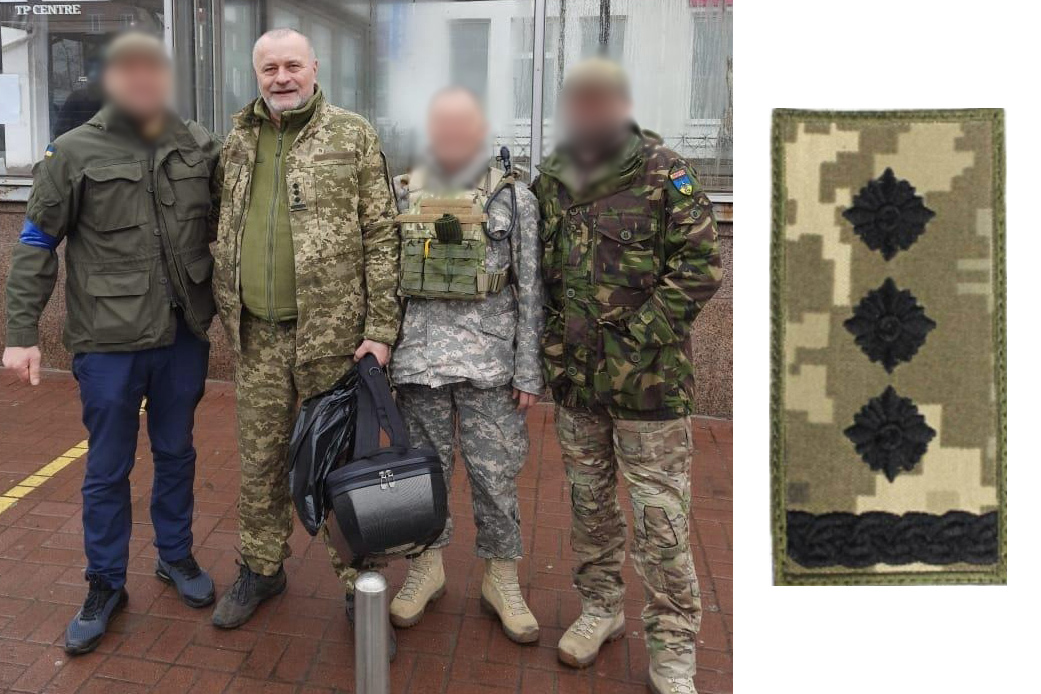
After the full-scale Russian war broke out in February, Kapuscinski joined the army. For that reason, the court suspended his case and then paid back his bail in May 2022.
“He will do anything now to stay here,” a former member of an organized crime group said of Broda who, he believes, fears extradition to Poland, where he is wanted.
Joining the Legion as a private like everyone else, Kapuscinski quickly rose to power and started introducing himself as a colonel while the Ukrainian laws only allow foreigners to serve in the country’s Armed Forces in the lower ranks.
Soon after joining the Legion, Kapuscinski’s authority expanded from overseeing the dorms to being in charge of practically everything, according to the former soldiers who spoke to the Kyiv Independent
“All the information, everything you could possibly need was all going through Sasha,” one legionnaire said of Kapuscinski, referring to him by the name he uses in the Legion.
If Kapuscinski and Vashuk are untouchable, they aren’t the only ones.
Commanders of the army-led wing of the Legion also enjoy impunity despite endless complaints from personnel. Among them is lieutenant colonel Bohdan, commander of the 3rd Battalion. Legionnaires complain about his behavior at his previous posting, as commander of the 1st Battalion.
“He's very well-connected, which is why he's still in the Legion,” a soldier doing administrative work in the Legion said.
The battalion’s officers and privates filed petitions to the Armed Forces’ high command, reports to the parliament, and letters to the embassies accusing Bohdan of behaving erratically and mismanaging the unit.
“I have never seen in my life worse leadership. Please, for the love of God, replace him with anyone before good people get hurt or die,” one of the soldiers’ testimonies reads.
“Several hundred have left the Legion, not because of fear but because of frustration with the leadership abilities,” reads the report of another soldier concerning Bohdan.
Bohdan’s subordinates had been calling for his removal and investigation into him for months before he was transferred to head the 3rd Battalion, another formation within the army-run part of the International Legion, in late May.
Some soldiers consider it a promotion and are frustrated he did not face justice. Others say he has changed for the better in the new unit and is now a decent commander, although they think he should be held accountable for his past misdeeds.
Bohdan denied all allegations against him in a conversation with the Kyiv Independent.
Power abuse
Many legionnaires accused their commanders of harassment, physical threats, and incompetence.
Legionnaires claim that Bohdan planned missions poorly and neglected most of his duties while in charge of the 1st Battalion.
Many soldiers flagged Bohdan’s drastic mood swings which, they believe, put their lives at additional risk.
“People are telling their families to blame him (Bohdan), not the enemy, in case they die,” one legionnaire’s testimony reads.
“Screaming at soldiers, telling some of them he doesn't need them. Ukraine doesn't need them,” another soldier told the Kyiv Independent. “He would go from calm and collected to completely flying off the handle.”
Bohdan also allegedly threatened to physically harm his soldiers on a few occasions.
One episode was allegedly caught on tape. In a video secretly recorded by a legionnaire that was leaked to the Kyiv Independent, a serviceman threatens to harm a subordinate. While the person isn’t clearly seen in the video, legionnaires say that they recognize Bohdan’s voice.
“One more word, one more movement. You will be f*cking destroyed,” Bohdan allegedly says to the soldier in English with a heavy accent.
“Everybody will say that you just fell down. Suddenly. And you will have a good chance to go to Ukrainian prison. I will call my criminal friends and tell them: ‘Guys, expect him.’ I will send them your (ID) and you will have a good time in a Ukrainian prison.”
Bohdan and the legionnaires describe the reason for the altercation differently. The legionnaires say that he was scolding the soldier for refusing to go on a mission while being ill. Bohdan said the issue was that two legionnaires looted locals’ houses.
“I mentioned the prison because one of them had something to do with the criminal world. Yes, I was angry because some fight and die, while others steal things from poor people,” Bohdan said, adding that he had passed the information to the local Military Police.
Both local Military Police and the Military Prosecution told the Kyiv Independent they have no information on such events.
Bohdan also denied that he meant to threaten soldiers with his prison connections: “I do not have prisoner friends.” Several of his subordinates, however, said that he often bragged about such connections.
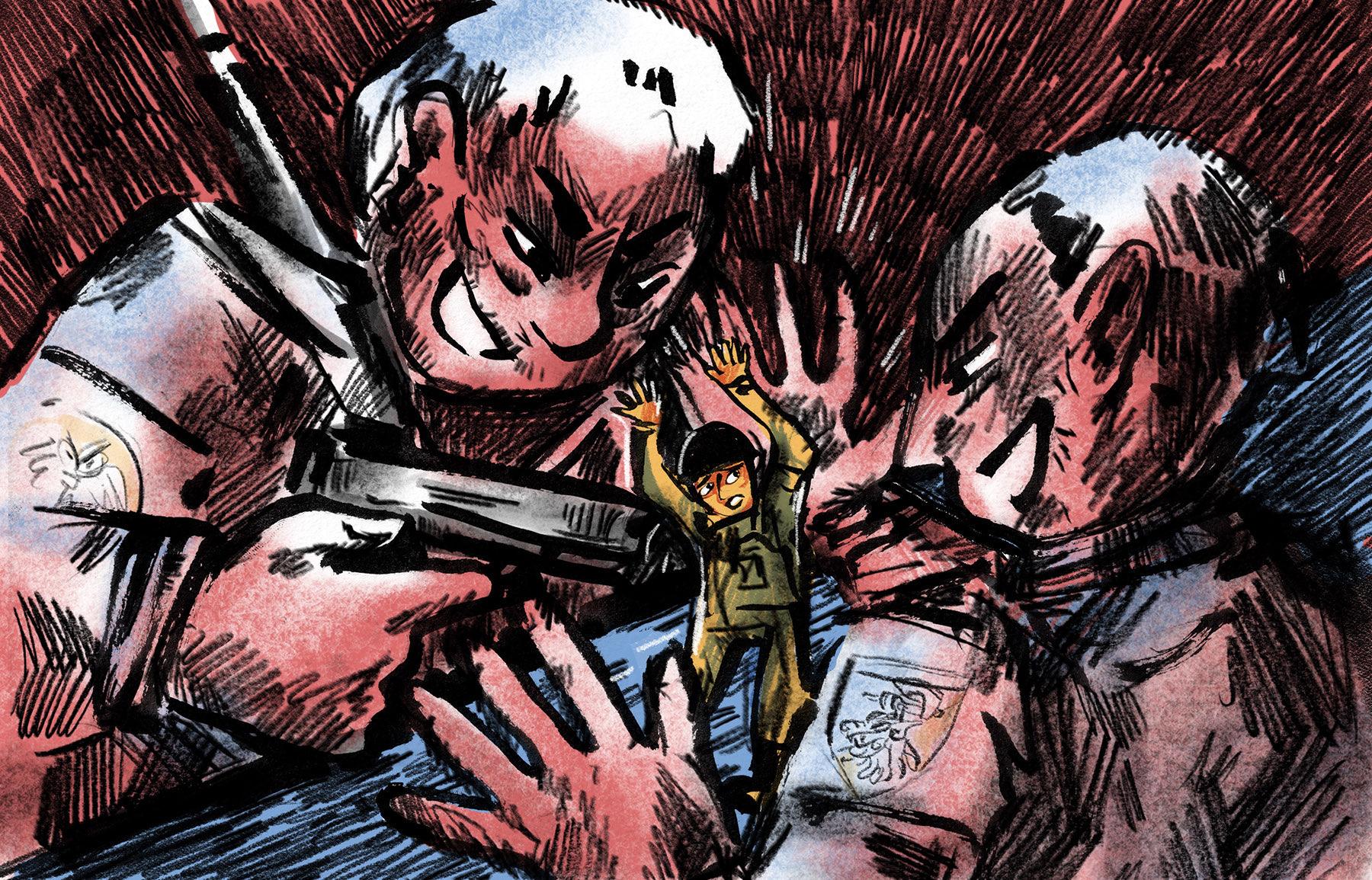
In the other wing of the Legion, Kapuscinski often abused his power, too, according to the soldiers.
“He has this style, he would be yelling at people,” one soldier told the Kyiv Independent.
He allegedly sexually harassed women, mirroring his past behavior noted in court records in Poland and Ukraine. “A couple of times he forced me to sit on his lap…He just pulled me,” a former female legionnaire said. On another occasion, she said, Kapuscinski tried to force her to kiss him, which she refused. One of her comrades backed up her account.
“I personally witnessed Sasha (Kapuscinski) catcalling women in Kyiv in a way that I found astonishing,” another soldier recalled.
In its previous article, the Kyiv Independent detailed how Kapuscinski allegedly harassed a female medic.
Kicking soldiers out
Many of the legionnaires didn’t tolerate their commanders' behavior. Some tried to stand up for themselves. With Kapuscinski, it often resulted in backlash.
“When somebody tries to confront him, he just starts using his own connections and saying stuff like that: ‘Oh, yeah, you're gonna be kicked out. And now you're not gonna go through Poland safely’,” one soldier said. Since the war brought all flights out of Ukraine to a halt, the most common way to travel to and from Ukraine is through Poland.
Often Kapuscinski’s threats led to action: He expelled soldiers from the Legion for asking too many questions or confronting him about stealing, according to legionnaires.
Both Kapuscinski and Bohdan kicked out such soldiers under what soldiers claim to be made-up pretexts: Kapuscinski accused soldiers of deserting while Bohdan would accuse them of spying.
“He was just kicking soldiers out like trash or threatening them that if they cause problems, they are going to have problems with the authorities,” said one soldier who Kapuscinski expelled.
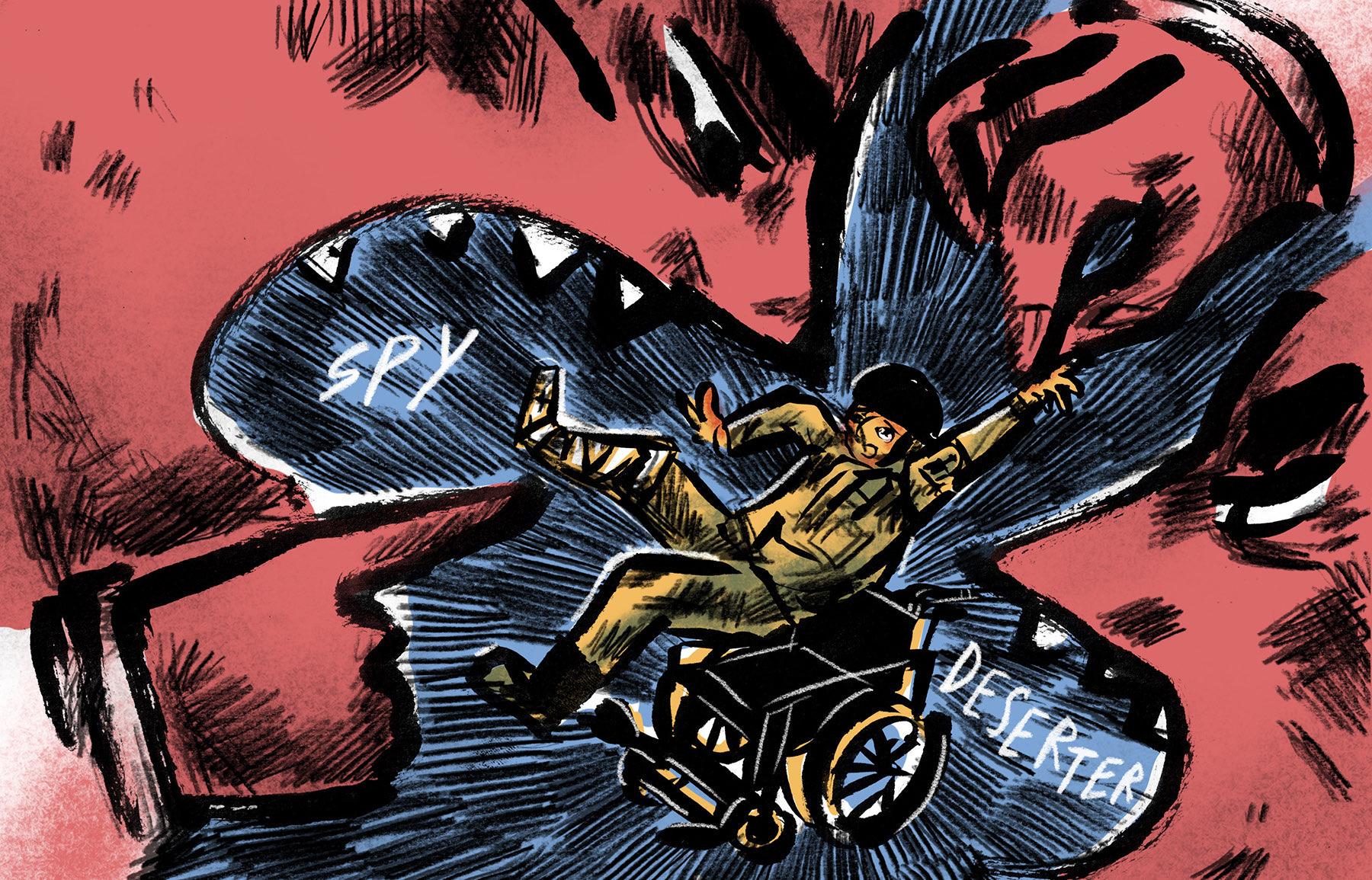
At times it got physical.
Once Kapuscinski together with an unidentified accomplice forced a soldier out of the Legion when he was in the hospital undergoing treatment after breaking his neck. The soldier said he was falsely suspected of being a deserter.
“Sasha (Kapuscinski) and his goon came into the hospital, told the doctors to get aside, and physically grabbed me out of the wheelchair…took me to the base,” a soldier who got expelled recalled. He was one of the two soldiers being kicked out on that day.
Kapuscinski refused to let him take his equipment worth over $3,000, the soldier said, and then drove him to the train station.
“(He) put me out on a train to Lviv where I spent the next 18 hours obviously in tremendous pain as I had a broken neck,” he went on.
It wasn't the only time when a soldier from the military intelligence-overseen part of the Legion would get expelled while being sick. Another fighter was shown the door after damaging his meniscus during training without letting him get treatment first.
“Taras forced me out while I had a problem with my knee,“ a soldier said of Major Vashuk.
According to this soldier, doctors prescribed him to undergo physiotherapy for a couple of weeks but Vashuk wouldn’t greenlight it.
“We have to feed you and you are useless. It is not possible for you to stay out of the game for weeks. You have to leave the Legion,” the soldier recalled Vashuk saying.
Having been expelled from the Legion he went to his home country to recover. He soon returned to fight for Ukraine but outside the Legion, in one of the other formations that allow foreigners to join ranks.
After some time, his knee started hurting like never before. The medics told him he needed urgent surgery, adding that his meniscus should have been operated on months ago when it was first hurt.
Multiple legionnaires complained about not receiving proper medical treatment while serving in Ukraine. Other soldiers red-flagged Vashuk’s brutal behavior, too.
In late March, about 30 Georgian soldiers decided to resign after having suffered heavy casualties during what they claimed was a suicide mission they were sent northwest of Kyiv.
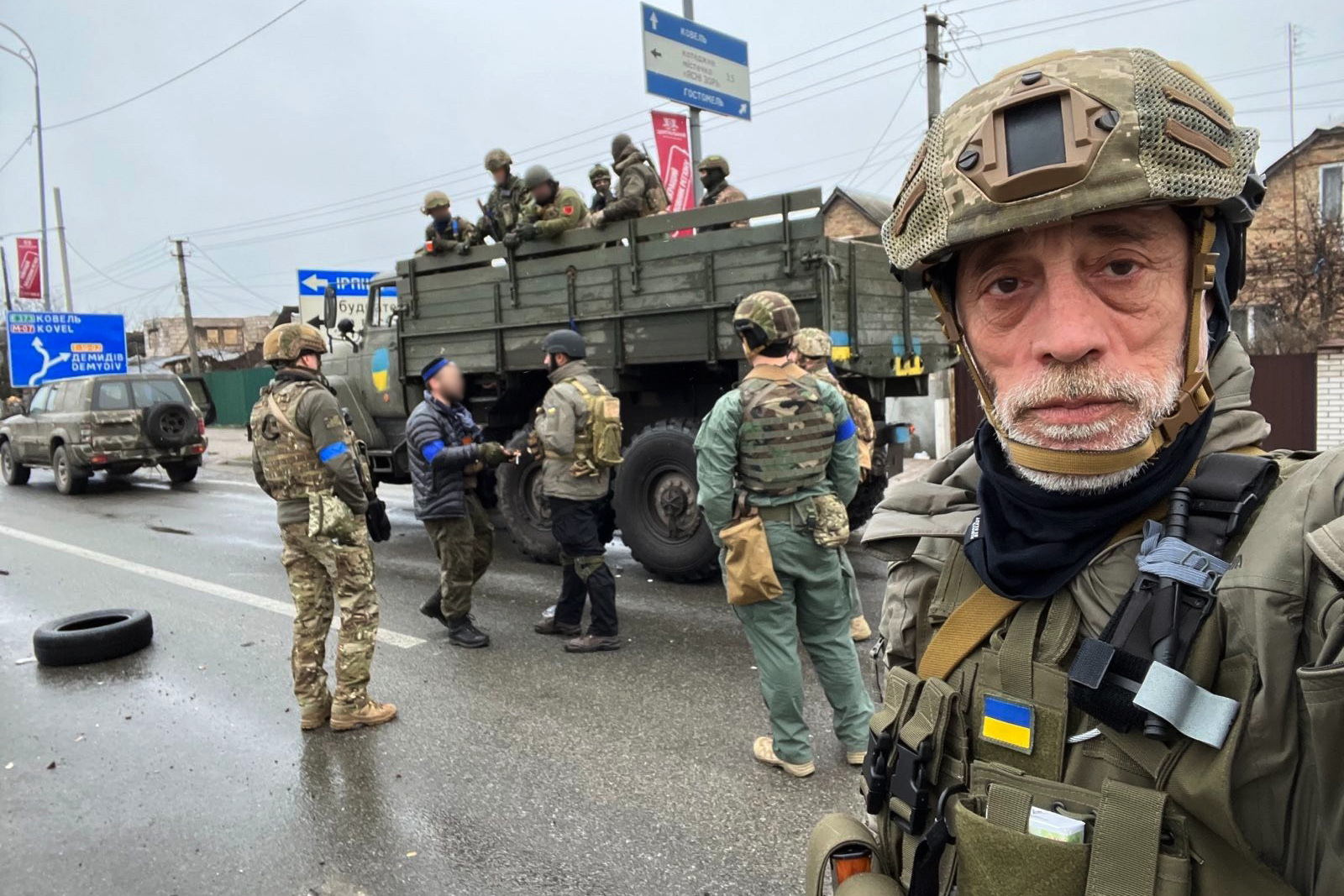
Vashuk was allegedly unhappy about it. He asked the soldiers to undress and give him their uniforms and backpacks, legionnaires recalled. They refused, arguing it was cold outside.
“Taras kicked my backpack and said: ‘I don't give a f*ck, take off everything and leave.’ I stepped forward and told Taras to watch his mouth,” said Nadim Khmaladze, who agreed to be named.
Then Vashuk took out his gun, reloaded it, and pointed at him, Khmaladze said.
“I went towards the gun. I stood in front of him and said: ‘You b*tch if you got a gun, shoot’,” Khmaladze said. Other legionnaires who were present during the conflict confirmed his recollection of events. Vashuk did not respond to the Kyiv Independent’s request for comment.
This was not the first time when an officer of the intelligence-run part of the Legion allegedly raised a gun at a subordinate.
Another legionnaire told the Kyiv Independent that Kapuscinski had confronted a fellow soldier in the same manner.
“While in the facility in Kyiv, we even heard that Sasha (Kapuscinski) pointed his weapon at one of our own because this guy refused to hand over his magazines,” he said.
In its previous article the Kyiv Independent reported about Kapuscinski pointing his gun at an American Jewish soldier after he had refused to give away his equipment to him.
Like Vashuk and Kapuscinski, Bohdan also often expelled soldiers from the Legion, his subordinates said. According to them, Bohdan kicked multiple soldiers out, accusing them of spying for either their countries or Russia, something they denied.
One company commander had been complaining about their leadership’s mismanagement for over a month until in April Bohdan decided to expel him, his testimony reads. He gathered both Ukrainian and foreign officers and proclaimed the soldier in question a spy.
“This ‘meeting’ turned out to be a genuine homemade Stalinist-styled people's court, where Bohdan tried framing me for being a Russian spy,” the legionnaire’s report reads.
What saved him, he writes, is that “the foreign officers were not buying any of it.”
Bohdan recalled the events differently.
“I received a report of suspected espionage from other legionnaires. I then reported this to the military counter-intelligence in accordance with the procedure. They (soldiers) were taken from the unit by representatives of the counterintelligence of the SBU. Later I learned that this suspicion was confirmed with evidence,” he went on.
The soldier’s report reads that he was questioned by two SBU officers who he claims found no “incriminating material” against him. The SBU press service refused to comment on the matter saying that “details of counterintelligence of the SBU cannot be a subject of public discussion.”
The legionnaire eventually resigned. “I was thoroughly done serving in the Legion. Understandably so, I might add.”
Legionnaires call for change
The endemic abuse of power by the commanders made foreign fighters’ service to Ukraine way harder than it could have been.
“For seven months soldiers here have been fighting on two fronts, one is Russia’s army, and another one is corruption. The only reason why Ukraine is winning is that Russia is rotten in corruption even more than Ukraine is,” one legionnaire told the Kyiv Independent.
The soldiers call upon authorities to reform the Legion. They are afraid that instead, authorities could just shut it down as an easier solution to end the complaints.
“We do not want the Legion to be closed, but to be reformed by NATO officers able to do so. Getting rid of the Legion will be a loss of opportunity for Ukraine. It has incredible potential, but the leadership must be changed,” the soldier went on.
“There is no trust in the officer structure. And there's no accountability. They don't have to answer to people, there's no checks and balances,” another legionnaire said.
Speaking of Kapuscinski as the most frequent target of complaints, one legionnaire told the Kyiv Independent: “The idea that the Legion was being in some capacity led by a Polish gangster, who was potentially skimming off the top, and that the Ukrainian military leadership or the military intelligence leadership allowed this to happen, I find it, I don't know, infuriating.”
“I have friends that died. I carried the body of one of my friends out of combat. I have other friends who have been emotionally shattered by combat that they saw in Ukraine as part of the Legion and are really struggling with it,” he went on.
“It dishonors the Ukrainian army,” he said of the Legion’s leadership misconduct. “It dishonors the Legion as a whole. And I find it extremely frustrating.”
______________________________________________________
Note from the authors:
Hi, it’s Anna and Alexander, the journalists who wrote this piece for you.
We spent months digging out the evidence for this story for you to know what’s happening in the International Legion. We believe that journalism must preserve its watchdog function in any circumstances, and that it’s of utmost importance to shed light on possible misconduct in the army, especially during the war, when people’s lives are at stake. We expose misconduct because we think it’s in the best interests of the Legion and its members, as well as the Ukrainian military as a whole. Please consider supporting our work by becoming a patron of The Kyiv Independent.



